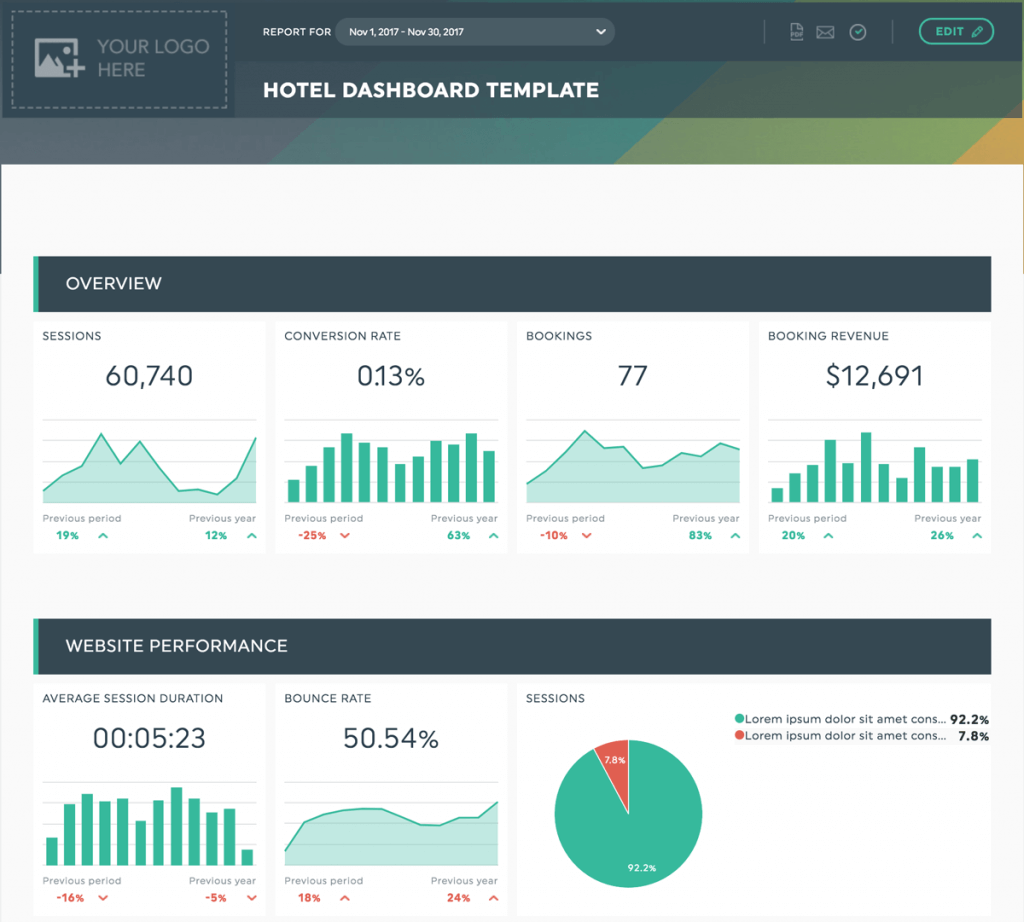How to Create Kickass Hotel Reports [Spoiler Alert: Template Included]

Let us not mince words, you’re looking to create kickass hotel reports, and that’s exactly what you’re gonna do after you read through this article.
You might be wondering how I can be so sure of that. Well, even though I’m only the new content writer here at DashThis, with a lot left to learn, one thing I do know is that Laury, who’s one of our account managers, is the kind of person you can trust with your soul, or at least your DashThis account, and she sure as hell knows what she’s talking about when it comes to hotel reports.
In fact, I walked into her office the other day to ask about a new DashThis feature and found her deep in conversation with one of our hotel manager new clients. She was feeding him awesome pieces of advice on how to get started with his hotel reports.
“Interesting,” I thought. “advice like this is worth thousands of dollars to any hotel manager who wants to make the most out of his hotel reports.”
So instead of coming back later, I just stood right in front of her like some creepy, stalking writer and wrote down everything she said like some, well, creepy, stalking writer.
So keep on reading, you lucky hotel manager I sacrificed my dignity for; this one’s for you.
What should your hotel reports sections be?
One of the first things Laury made clear to our new client is that, while there’s no magic recipe when it comes to creating awesome hotel reports, there are a few crucial elements that you should make sure to start with.
-
Overview
The first section of your report should be an overview that presents the data you consider to be the most essential in understanding your business’ health at a glance.
-
Traffic
This is where you should put all the important information regarding your website’s traffic.
-
Booking
This section of your hotel reports should include data about your customers’ behavior when booking a stay at your hotel.
-
PPC
This is where you should display the important information regarding your paid ads.
-
SEO
Use this section to keep track of your search engine optimization results.
-
Social media
Social media is your best ally when it comes to interacting with your clients and potential clients. Needless to say, this data is crucial and you’re gonna want to add it to every one of your hotel reports.
“Now remember”, said Laury to our client, “there’s nothing like exploring the options on your own and finding out what’s best for your business. This is only a flyover above an ocean of possibilities.”
Yeah, Laury is quite the poet.
What KPIs should you be tracking in each section of your hotel reports?
Laury couldn’t insist enough on this: your KPI options are limitless! It all depends on what is important to your business. To point her client in the right direction, she listed a couple KPIs that he should start with and heck, it made so much sense and she made the whole reporting process seem so easy, that it made me wanna become a hotel manager myself, how crazy is that?
Overview:
Showcase your most important KPIs at the top of your hotel reports. These should include:
-
Visits on site
How many people visited your website this past week, month, or year? Follow the progress with this metric.
-
Conversion rate
What percentage of your visitors took the action you wanted them to? The word “conversion” can mean whatever you want it to, but in most cases, as a hotel manager, it means booking a stay at your hotel.
-
Number of bookings
This one is self-explanatory, but nonetheless crucial: you should use your hotel reports to track how many stays were booked.
-
Booking value
What’s the average value of all the bookings that were made through your website?
Traffic:
-
Session duration
How long your visitors stay on your website is a very useful KPI to track on your hotel reports.
-
Bounce rate
What percentage of visitors left your website after just a few seconds without taking any action? Knowing who these people are and what brought them to your website in the first place can help you better target the visitors who will end up booking a stay.
-
Number of visits/number of bookings/booking value – per channel
These channels can either be organic, paid, or social. Find out which of these brings the most traffic and transactions on your website to better orient your marketing strategy.
-
Number of visits/number of bookings/booking value – per device
Do your visitors mostly land on your website through a mobile device, or a desktop computer?
-
Number of visits/number of bookings/booking value – per country
You probably have clients from all around the world. You might wanna see where these people are from on your hotel reports.
Bookings:
-
Average length of stay
How long do people stay at your hotel, on average? Use this metric to see how you could work on building value to increase this number.
-
Type of room booked
Such information is a useful addition to your hotel reports, especially if you have a promotion for a certain type of room going on, for example.
PPC (pay-per-click):
-
Cost
How much your PPC strategy has cost you over a given period of time is certainly a KPI you’re gonna wanna add to your hotel reports.
-
Clicks
How many clicks on your paid ads did you get out of your campaign?
-
Conversion rate
What percentage of people clicking on your paid ads turned into people booking a stay? Add this metric to your hotel reports to track the profitability of your advertising campaigns.
-
Number of paid bookings
How many bookings came from paid advertising?
-
Booking value
What is the average value of the bookings that came from paid advertising?
-
CPA (cost-per-acquisition)
The cost-per-acquisition (also called cost-per-conversion) is calculated by dividing your total AdWords campaign cost divided by the number of bookings.
-
ROAS (return on ad spend)
This number is a must for your hotel reports, as it represents the revenue your paid ads have generated, divided by the cost of said paid ads.
SEO:
-
Organic visits
How many visitors landed on your website due to an organic search?
-
Organic conversion rate
The percentage of these organic visitors that booked a stay is a powerful insight to add to your hotel reports.
-
Organic bookings
How many bookings come from organic searches? This metric is a great indicator of your general SEO performance.
-
Organic booking value
What is the average value of all your bookings that are derived from organic searches?
Social media:
-
Number of followers per platform
Use this KPI to keep track of the platforms on which your hotel is the most popular.
-
Engagement rate
The engagement rate represents the number of people who interacted with an online post compared to the number of people who saw it. On Facebook, engagement could mean either commenting, sharing, liking, or reacting with an angry face or a heart, for example.
Bonus:
-
Newsletter subscribes/unsubscribes
If you have a newsletter, keep track of the number of people who subscribe and unsubscribe to it. You need your newsletter content to be as kickass as your hotel reports, if not more!
-
Relevant reviews
Adding a “relevant reviews” section to your hotel reports might be a good idea, so you can keep an eye on what people like most about your hotel as well as what could be improved.
What tool should you use to keep track of all these KPIs?
Judging by Laury’s facial expression, I could tell the conversation had gone well. My colleague hung up, to the great relief of my wrist which couldn’t stand any more verbatim transcription. I can’t help it; I’m a very thorough creepy, stalking writer.
Later on that week, our client reached out to Laury to tell her how happy he was with his DashThis hotel reports. He couldn’t believe how easy it was for him to track all his important data in a single report.
Well, dear hotel manager, that’s DashThis for you. Everything about our tool has been thought-out in terms of user-friendliness and easy usage. And since we want your hotel reports to go as smoothly as possible, we created a hotel dashboard template featuring all the above KPIs, which you can use as it is or customize at will according to your needs. Here’s what it could look like.
All you have to do is connect the sources you wanna keep track of by entering your credentials, select the metrics you wanna include and smile at life. Like, literally. It’s that simple.
So, what do you say? Aren’t you gonna give DashThis a try?
Ready to automate your reporting?
Read More
Don’t miss out!
Automate your reports!
Bring all your marketing data into one automated report.
Try dashthis for free


